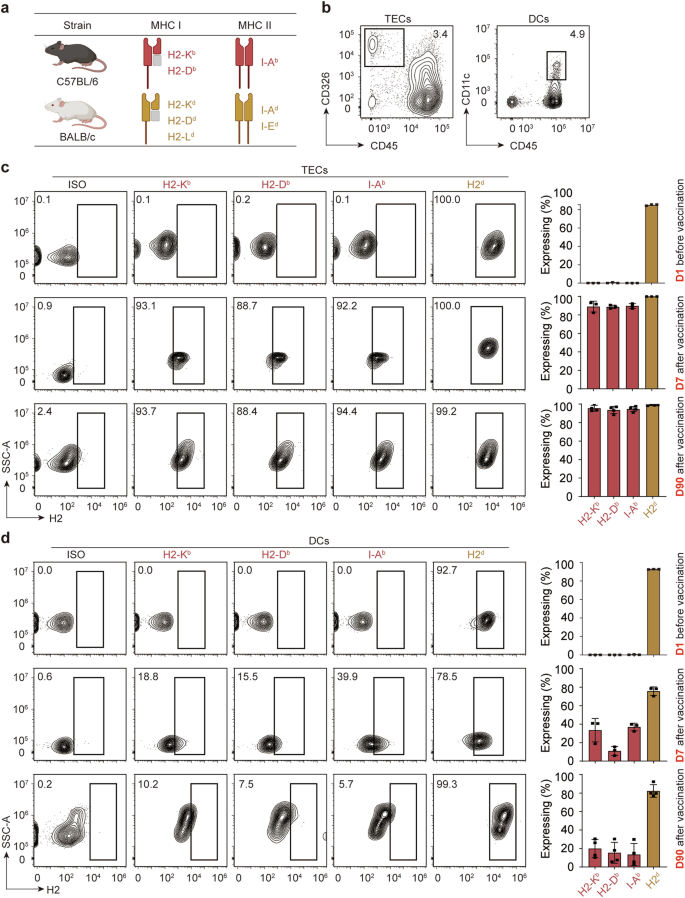Donor MHC-specific thymus vaccination allows for immunocompatible allotransplantation
IF 25.9
1区 生物学
Q1 CELL BIOLOGY
引用次数: 0
Abstract
Organ transplantation is the last-resort option to treat organ failure. However, less than 10% of patients benefit from this only option due to lack of major histocompatibility complex (MHC)-matched donor organs and 25%–80% of donated organs could not find MHC-matched recipients. T cell allorecognition is the principal mechanism for allogeneic graft rejection. We herein present a “donor MHC-specific thymus vaccination” (DMTV) strategy to induce T cell tolerance to both autologous and allogeneic donor MHC. Allogeneic MHC molecules were expressed in the recipient thymus through adeno-associated virus-mediated delivery, which led to stable expression of allogeneic MHC together with the autologous MHC in the engineered thymus. During local T cell education, those T cells recognizing either autologous MHC or allogeneic MHC were equally depleted. We constructed C57BL/6-MHC and BALB/c-MHC dual immunocompatible mice via thymus vaccination of C57BL/6-MHC into the BALB/c thymus and observed long-term graft tolerance after transplantation of C57BL/6 skin and C57BL/6 mouse embryonic stem cells into the vaccinated BALB/c mice. We also validated our DMTV strategy in a bone marrow, liver, thymus (BLT)-humanized mouse model for immunocompatible allotransplantation of human embryonic stem cells. Our study suggests that the DMTV strategy is a potent avenue to introduce a donor compatible immune system in recipients, which overcomes the clinical dilemma of the extreme shortage of MHC-matched donor organs for treating patients with end-stage organ failure.


供体mhc特异性胸腺疫苗允许免疫兼容异体移植
器官移植是治疗器官衰竭的最后选择。然而,由于缺乏主要组织相容性复合体(MHC)匹配的供体器官,只有不到10%的患者从这一唯一选择中受益,并且25%-80%的捐赠器官无法找到MHC匹配的受体。T细胞异体识别是同种异体移植排斥反应的主要机制。我们在此提出了一种“供体MHC特异性胸腺疫苗”(DMTV)策略来诱导T细胞对自体和异体供体MHC的耐受。同种异体MHC分子通过腺相关病毒介导的递送在受体胸腺中表达,导致同种异体MHC与自体MHC在工程胸腺中稳定表达。在局部T细胞教育过程中,那些识别自体MHC或同种异体MHC的T细胞同样被耗尽。我们通过在BALB/c胸腺中接种C57BL/6- mhc,构建C57BL/6- mhc和BALB/c- mhc双免疫兼容小鼠,并观察将C57BL/6皮肤和C57BL/6小鼠胚胎干细胞移植到接种BALB/c小鼠体内后的长期移植物耐受情况。我们还在骨髓、肝脏、胸腺(BLT)人源化小鼠模型中验证了我们的DMTV策略,用于人胚胎干细胞的免疫相容异体移植。我们的研究表明,DMTV策略是在受体中引入供体兼容免疫系统的有效途径,它克服了mhc匹配供体器官极度短缺的临床困境,用于治疗终末期器官衰竭患者。
本文章由计算机程序翻译,如有差异,请以英文原文为准。
求助全文
约1分钟内获得全文
求助全文
来源期刊

Cell Research
生物-细胞生物学
CiteScore
53.90
自引率
0.70%
发文量
2420
审稿时长
2.3 months
期刊介绍:
Cell Research (CR) is an international journal published by Springer Nature in partnership with the Center for Excellence in Molecular Cell Science, Chinese Academy of Sciences (CAS). It focuses on publishing original research articles and reviews in various areas of life sciences, particularly those related to molecular and cell biology. The journal covers a broad range of topics including cell growth, differentiation, and apoptosis; signal transduction; stem cell biology and development; chromatin, epigenetics, and transcription; RNA biology; structural and molecular biology; cancer biology and metabolism; immunity and molecular pathogenesis; molecular and cellular neuroscience; plant molecular and cell biology; and omics, system biology, and synthetic biology. CR is recognized as China's best international journal in life sciences and is part of Springer Nature's prestigious family of Molecular Cell Biology journals.
 求助内容:
求助内容: 应助结果提醒方式:
应助结果提醒方式:


